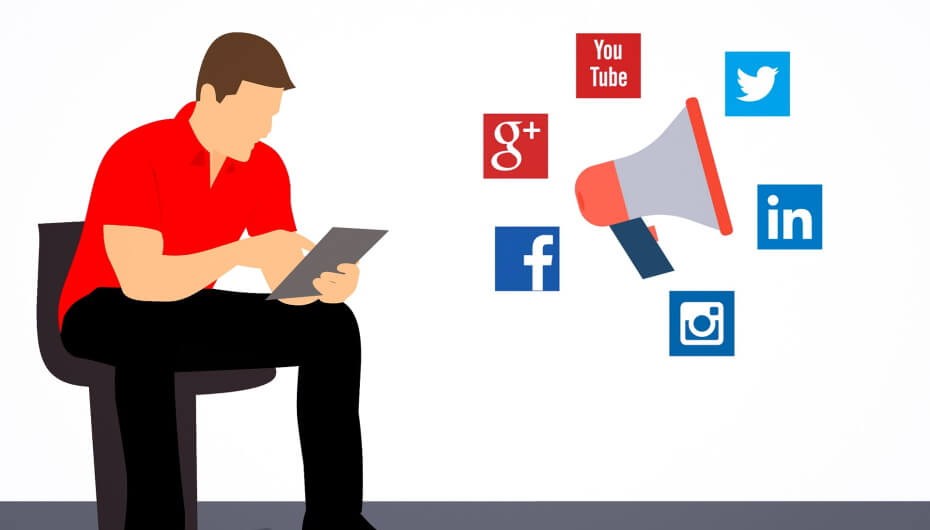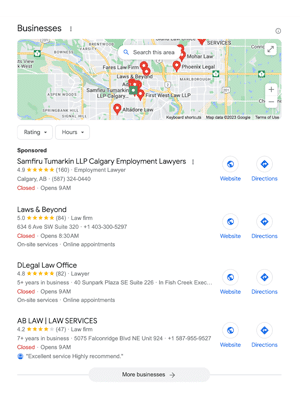If you run a small business, social media is an essential marketing tool that you can’t do without. Let’s face it, most of our world revolves around and depends on social media.
From keeping in touch with friends on the other side of the world, potential employers checking up on employees, and even finding romance—we depend on social media more than we would like to admit.
Social media is free and mobile. We can access our social media platforms from absolutely anywhere and rarely have to pay additional costs. And it’s not just free for personal use. Small businesses are quickly appreciating the value of social media. You can use social media to seek talent, expand your clientele, learn about your competition, and so much more.
The problem is, with such an arsenal of tools, where do you start using social media to benefit your business? How do you know what is going to benefit your business, and what could harm it? Even though social media plays a significant role in the commercial and non-commercial world, it doesn’t mean you should go online and start posting.
Let’s begin our definitive guide to social media for small businesses with why it is so important.
Why Social Media is Essential for Small Businesses
Before the world of social media, small businesses had the advantages and disadvantages of word of mouth. The theory was simple—if your product or service were good, people would talk about it. If your product or service were bad—people would talk about it. Nowadays, social media has become the new word of mouth marketing. And your company’s reputation depends on what people post on social media platforms.
One conceptual study found that small businesses on a limited budget can use social media to enhance their brand awareness.

This might not be enough to convince you of the power of social media. So, we’ve put together five incredible social media statistics based on a variety of studies.
- By the third quarter of 2019, Facebook had 2.5 million monthly active users, with 86% of marketers using Facebook in their brand marketing efforts.
- Instagram has more than 1 billion monthly users, and 90% of them follow a business.
- 89% of participants in one survey felt that Instagram was the most important social media platform for influencer marketing.
- LinkedIn is the most effective platform for lead generation and customer acquisition—it is 277% more effective than Facebook.
- Twitter is the top platform for discovering—79% of the 330 million active users like to discover new things.
The numbers alone may not be enough to motivate you to jump on social media. But there is an arsenal of platforms to choose from. For your small business to get the most out of social media, the key is choosing the right sites.
Using the Right Social Media Platform
The main point of social media is to increase your brand awareness, sales, and, therefore, profits. It’s important to realize that managing your social media platforms takes time. So, don’t try and use all of them. You will only run the risk of spreading yourself too thin. It is better to select a few and use them to their full capacities.
The first thing you need to do is understand your target audience. Look at gender, age, cultural background, education, etc. You can do this by analyzing your current customers. For example, 82% of millennials use Facebook, whereas professionals tend to use LinkedIn. By understanding your target audience, you will get a better understanding of the most effective social media platforms for you.
It is also necessary to understand that not every social media platform is the same. People will use different platforms for different activities, whether it’s for news updates or blogging. Social media can be categorized into six groups:
- Social Networking sites such as Facebook
- Bookmarking sites like StumbleUpon
- Social News sites include Reddit and Digg
- For Media Sharing—YouTube is a favorite
- Twitter is used for Microblogging
- Finally, there are a great number of sites that focus on Blog Comments and Forums, like Quora
For your business to successfully use social media, you must select platforms that attract your target audience and will boost the number of clients you receive.
How to Develop Your Social Media Marketing Strategy
Now that you are aware of the benefits and who you are targeting, it is time to turn your attention to developing the right marketing strategy. Although you should develop a strategy that is unique to your business needs, here is a seven-step guide to help create a social media marketing strategy:

1. Know your business goals
Without goals, a company has no direction and will find it difficult to achieve success. Most likely, you already have a list of business goals. If so, now is a good time to revise these goals. If you don’t have goals, it’s essential to set a few. Once your business goals are clearly defined, you can decide how social media can help you achieve them.
2. Set your marketing goals
You may have already heard of the S.M.A.R.T. method for setting goals. Each goal should be:
Specific Measurable Achievable Relevant and Time-bound
Let’s use an example of what a SMART goal is and what it isn’t. For example, you may have the goal of generating more leads and increasing sales. While those are great goals, they are not specific or measurable. You need to set a specific number that you know you are going to be able to achieve. So, it could be that you want 30% more leads and 10% more sales within six months. Also, know what tracking tools and analytics you are going to use to measure your goal and have a clear deadline for when you want to achieve them.
3. Reassess your target audience
You have already studied your clients to gain an understanding of your target audience. Now that you have clear goals in mind, double-check that your target audience is still appropriate.
4. Find out about your competition
Following what your competition is doing online allows you to see what is working for them and what isn’t. Learn what type of content they are posting. Look at which posts gain the most likes or comments, and how the company interacts with their customers via social media platforms.
5. Decide on the content you are going to post
The most successful social media marketing campaigns focus on posting entertaining content. This type of content usually includes text with images or videos. You also need a schedule for posting and to post at the right time for your audience.
6. Create a budget
You can indeed create a social media marketing strategy with little or even no money. Keeping your marketing budget small is the best option if you are just starting out. In time, you can invest more money in your social media marketing efforts. This could include pay-per-click advertising, advertising, and using tracking tools or analytics software.
7. Delegate roles
If you are running your business alone, you will have to take on all roles, at least for now. Even if there are only a few of you, each employee could take on certain roles within your social media platforms. One person could be in charge of the content while another is responsible for customer interactions.
Posting Content on Your Social Media Platforms
It’s worth bearing in mind that you are only as good as your last post. From a customer’s point of view, they are only going to remember your brand based on the last thing they saw on your social media pages. The more often you post content, the more likely a customer will think of your company when they need your services. This is why posting frequently is crucial. The most successful small businesses post content weekly. In fact, 79% of small businesses post each week and 52% post daily.
The content you post has to be visually appealing and varied. People are generally put off by long chunks of text, so keep it short and to the point. Images and videos are a great way to get your message across. If you don’t have a massive budget for videos, your smartphone probably has a decent camera to create a video that you can then edit. For images, there are plenty of free stock photo sites.

The best time to post depends on the type of business you own. If you are targeting individual customers, think about the times when they usually check social media. The best posting times also vary depending on the social media platform. Generally speaking, the best time is between 9 am and 12 pm from Monday to Wednesday.
How to Repurpose Your Social Media Content
Repurposing your content is a way of recycling your content. It saves you a lot of time and work, as well as helping to increase your audience. Repurposing your content is not just reposting. It needs to be modified or updated.
First, to repurpose your content, you need to discover what content you have that is considered ‘evergreen’ or always relevant. From there, you can see which of your posts containing your evergreen content have been the most popular. Finally, you can take those posts and reinvent them for new content.
For example, an online clothing store has a range of shirts that they posted two weeks ago. They have been popular, and the company has received some great comments. The company could create a new video of these shirts being worn and include the positive feedback (ask permission before reposting customer comments).
Other ideas for repurposing include updating old posts, using different headlines, sharing content on forums, and creating GIFs. GIFs are a great trend at the moment and will draw a lot of attention to your social media platforms.
Other Ways to Boost Small Business Success
Apart from using social media to boost your company’s success, there are a few other strategies that can help grow your small business. Let’s briefly look at these.
Get reviews
People place a great deal of trust in online reviews. 31% of people are more likely to spend money on a business that has positive reviews. Make it as easy as possible for people to leave reviews. Here some ways to get more reviews online:
- Including a note with your product or service
- Send a follow up an email
- Have a link to your website where people can leave reviews
- Provide incentives to encourage customers to post feedback
- Use an automated service to manage online reviews
Make sure your customers know how important it is for you to receive reviews.
Dominate local search results
If you want to increase your brand presence in the local market, you need to dominate the local search results. These are results for local businesses that generally include the phrase “near me.”
The first step to dominating local search results is to optimize your Google My Business profile. This includes making sure that your profile is complete with accurate information. For example, check that opening times, location, and phone numbers are accurate. Also, you should post some pictures of your premises.
You should also focus on improving your local SEO and even consider target paid local marketing.
Provide an outstanding customer experience
It’s all very well looking for new clients, but don’t forget to look after the ones that you already have. You can provide customers with an amazing experience simply by interacting with them online. Thank people for their purchase and their feedback. Don’t ignore the negative reviews. Sometimes all people need is to know that you are listening. Remember that people reading your reviews and posts will pay attention to how you handle negative reviews. Customers who have a positive experience will bring you more clients, so take good care of them.
Related reading: how to improve your customer experience in five easy steps.
Conclusion
Social media is here to stay, and its popularity is only going to increase. Not everyone is keen to jump online and start posting for the world to see. That being said, if you have a small business, it’s time to overcome this fear and start using social media to your advantage. Clear goals, a smart social media marketing strategy, and frequent posting of the right content, is a cost-effective way to enhance your brand awareness, increase your sales, and help your company grow.
Contact a member of our team today to find out how to increase the number of reviews you get. Getting more reviews helps boost your ranking in the local search results and improves your online reputation.

